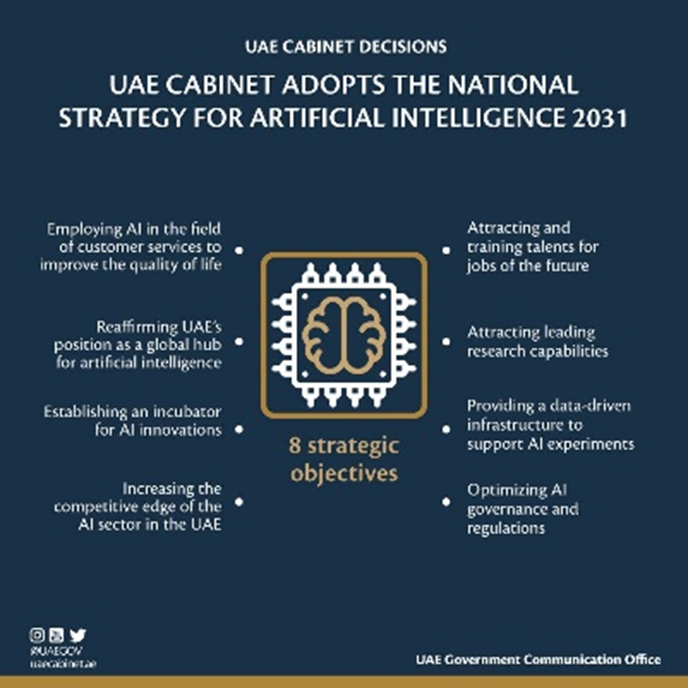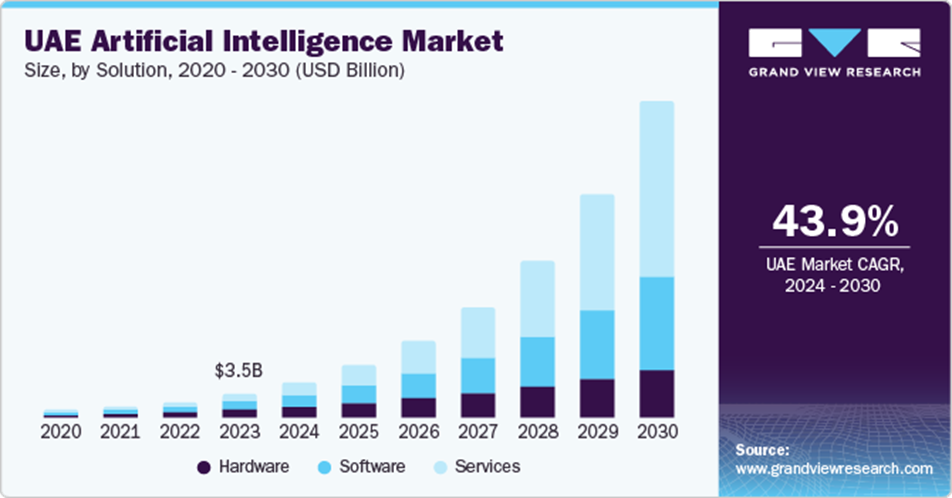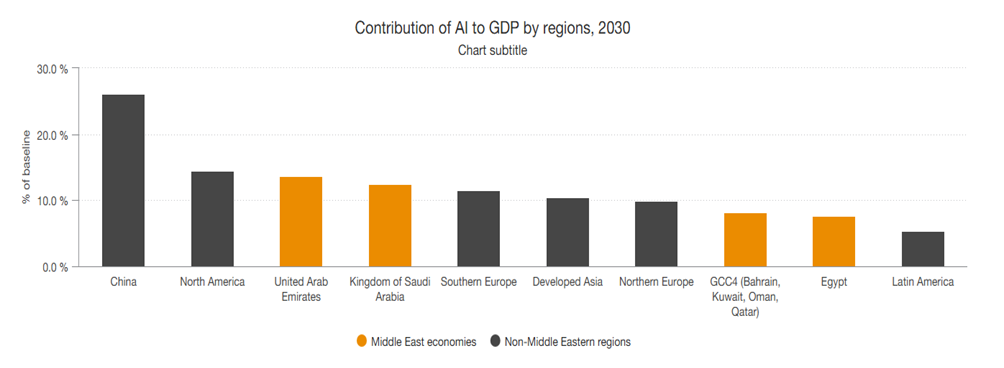The UAE is rapidly emerging as a global AI hub, driven by large-scale infrastructure investments, strategic partnerships with leading US tech firms, and an ambitious national agenda to embed artificial intelligence across government, education, healthcare, and security.
Amid global competition over technological supremacy, the United Arab Emirates has emerged as a contender in the race to dominate the future of artificial intelligence. Once best known for its oil wealth and iconic skylines, the UAE is now positioning itself at the cutting edge of digital transformation through a bold mix of infrastructure investments, geopolitical alliances, and strategic tech partnerships.
Central to this effort is Project Stargate, an AI supercluster under construction in Abu Dhabi that promises to rival the most advanced data centres in the world.
But this is only part of a broader ambition: in May 2025, US President Donald Trump’s historic tour of the Gulf region resulted in over $200 billion worth of agreements with the UAE, focusing heavily on AI, cloud infrastructure, and advanced manufacturing.
These developments are not mere symbolic gestures, they reflect a calculated national strategy by the UAE to transition from a regional logistics and finance hub into a sovereign AI powerhouse.
With homegrown companies like G42 taking centre stage and forming pivotal links with giants such as OpenAI, Microsoft (NASDAQ:), Nvidia (NASDAQ:), and Oracle (NYSE:), the UAE is crafting a unique role for itself: a nation small in size but immense in digital ambition.
The United Arab Emirates has made AI infrastructure a core component of its national strategy, with Project Stargate standing as the flagship initiative. Announced in May 2025, Stargate is a large-scale artificial intelligence supercomputing data centre under construction near Abu Dhabi.
The facility is being developed by G42, a leading Emirati AI and cloud computing company, in partnership with Microsoft, OpenAI, and several US hardware providers, including Nvidia. Once operational, Stargate is expected to be among the most powerful AI installations in the world, offering advanced computing capacity for both local and international users.
The project will be located within the Khalifa Economic Zones Abu Dhabi (KEZAD) and is designed to roll out in phases. The first phase, expected to come in 2026, will deliver 200 megawatts of AI computing capacity, eventually scaling up to a total of 5 gigawatts. The site will host the latest generation of Nvidia’s Grace Blackwell chips and is intended to support large-scale AI workloads, including the training and deployment of foundation models.
The infrastructure will also include secure environments tailored for regulated data operations, enabling both public and private sector applications.
Stargate is a critical part of the UAE’s broader goal to establish itself as a key player in global artificial intelligence. While many countries are investing in AI applications, the UAE is focusing on compute infrastructure, the foundational layer that enables advanced model development.
By prioritising access to high-performance computing, the UAE aims to position itself as a destination for firms and governments seeking large-scale AI capabilities. This approach reflects a strategic understanding that compute power, like energy in the previous century, is fast becoming a defining axis of global competition.
The project is led by G42, a UAE-based technology company that has become central to the country’s AI agenda. With strong backing from sovereign investors and close alignment with government policy, G42 plays a key role in the UAE’s efforts to consolidate digital infrastructure and expand technological capacity.
It is responsible not only for managing large-scale assets like Stargate but also for building platforms and services that integrate AI into key sectors, including healthcare, education, defence, and logistics.
The UAE’s AI strategy is articulated through its National Strategy for Artificial Intelligence 2031, which outlines plans to embed AI across public administration, economic development, and future skills training.
Ministries have begun integrating AI tools into core operations, national education curricula have been adapted to include AI literacy, and regulatory frameworks are evolving to accommodate the rapid deployment of emerging technologies. The focus is not on incremental change, but on achieving strategic scale in a short timeframe.

Overall, Project Stargate illustrates the UAE’s approach to artificial intelligence as a matter of national capability and international relevance. It is not simply a technological investment, but a calculated effort to ensure the country’s place in the evolving global AI landscape.
By building world-class infrastructure and forging partnerships with leading technology firms, the UAE is seeking to establish itself not only as a consumer of AI, but as one of the few states capable of enabling its future.
The strategic vision behind the UAE’s AI ambitions is reinforced not only by infrastructure but also by the country’s ability to build high-level international partnerships. Through a combination of diplomacy, commercial openness, and targeted co-investment, the UAE has secured collaborations with some of the most influential technology firms in the world.
These alliances not only bring technical expertise and capital into the country, but they also provide the UAE with a platform to shape emerging norms around artificial intelligence governance and deployment.
A key example is the relationship between the Emirati tech firm G42 and leading US companies. In April 2024, Microsoft announced a $1.5 billion investment in G42, granting the American firm access to the computing power of Stargate while establishing a shared governance structure to ensure compliance with US export controls and cybersecurity regulations. Microsoft will also serve as G42’s preferred global cloud partner, integrating Emirati infrastructure into Microsoft’s global AI and cloud strategy.
This partnership reflects a growing recognition that AI development increasingly requires international collaboration, particularly where large-scale computing resources are concerned.
The collaboration with OpenAI further highlights the UAE’s rising role in global AI. OpenAI intends to use Stargate’s infrastructure to run some of its most demanding model training workloads. This arrangement gives OpenAI expanded compute access in a secure, well-regulated environment while offering G42 and the UAE indirect access to the front lines of foundational model development.
It also reflects the evolving nature of the AI supply chain, where geography and political alignment now play roles alongside technical capability.
The geopolitical calculus behind these partnerships is clear. For the United States and its tech firms, the UAE offers a politically stable, resource-rich environment where high-performance compute can be deployed at scale without many of the logistical or regulatory challenges faced elsewhere.
For the UAE, partnerships with companies like Microsoft, OpenAI, and Nvidia offer access to best-in-class technology and intellectual property, while reinforcing its role as a trusted ally capable of handling critical infrastructure with global implications.
At the same time, these alliances require careful navigation. In 2023, G42 faced scrutiny from US lawmakers over past ties to Chinese technology firms, prompting the company to restructure elements of its operations and reinforce its alignment with US standards.
The 2024 Microsoft investment was contingent on guarantees that US-origin technologies would be protected from unauthorised access or transfer, particularly considering rising concerns over dual-use AI capabilities. As a result, the UAE has positioned itself as both an independent technological actor and a reliable partner within the broader Western strategic framework.
These constraints have not hindered the country’s ambitions. Instead, they have pushed the UAE to adopt a more transparent and internationally oriented model of AI development. The partnerships with US tech firms are structured to balance commercial opportunity with national security concerns, making the UAE a unique case: a state that is simultaneously sovereign over its infrastructure and integrated into a wider geopolitical alliance.
Ultimately, these alliances demonstrate how the UAE’s AI strategy extends beyond technical capability into the realm of soft power and global positioning. By offering infrastructure, capital, and regulatory clarity, the country is becoming a critical partner for firms seeking to scale AI operations across borders. In doing so, it is establishing itself as a significant player not just in the Middle East, but in the emerging global order of artificial intelligence.
While the UAE’s infrastructure and international partnerships are impressive, perhaps the most transformative element of its AI strategy lies in how it is embedding these technologies into its own society. The Emirates are not content with being a backend for foreign AI workloads, they are actively integrating artificial intelligence into the core of their national model.
This domestication of AI takes many forms, from state-backed public adoption to sectoral deployment, and it reflects the broader ambition to redefine governance, economy, and education through algorithms.
One of the most headline-grabbing moves came with the government’s decision to offer free ChatGPT Plus subscriptions to all UAE residents. At first glance, this may seem like a publicity stunt, but it signals something deeper: the belief that AI literacy is a national asset.
By giving millions of people access to a premium large language model, the UAE is attempting to democratise access to generative AI tools, both for productivity and for experimentation. Schools, universities, government departments, and small businesses now operate in an environment where high-end conversational AI is not a luxury but a norm.
This public rollout is backed by more targeted, high-stakes applications in health, logistics, public services, and national security. The UAE has deployed AI for predictive healthcare diagnostics, traffic optimisation, judicial analysis, and even border control and threat detection. G42 itself operates a biotech and health arm that has built massive genomic databases to personalise medicine and health policy across the Emirates.
These projects are not just pilot programs, they are becoming permanent fixtures in the country’s digital governance architecture.

Source: PWC
Yet, with this rapid integration comes a set of challenges that the UAE cannot ignore. First and foremost is the issue of data privacy. Unlike in the European Union, where GDPR frameworks enforce strict rules about data collection, storage, and consent, the UAE’s regulatory environment is more permissive.
This has raised concerns among international watchdogs and digital rights advocates, particularly as G42 and affiliated firms hold vast datasets related to biometric identity, health, and behavioural patterns. The government insists that all sensitive projects operate under tight oversight, but the lack of independent auditing makes this claim difficult to verify.
There’s also the geopolitical balancing act. The UAE’s previous AI ties with China, especially G42’s reported collaborations with Chinese firms, led to scrutiny from American regulators and intelligence officials. Although those relationships have now been curtailed or restructured to meet US export control standards, the memory of those links still shadows the UAE’s international credibility.
It has responded by adopting more transparent governance practices and aligning its tech development with Western norms, including ethical AI frameworks and cybersecurity protocols jointly developed with US partners.
Despite these complexities, what’s clear is that the UAE is not simply reacting to the AI revolution; it is trying to shape it. By embedding AI into its societal fabric and projecting it through infrastructure and diplomacy, the Emirates are building a model of digital transformation that is both ambitious and distinctly their own.
The United Arab Emirates is no longer just a spectator in the global AI race, it is rapidly becoming one of its most assertive players. Through monumental infrastructure like Project Stargate, unprecedented partnerships with Western tech giants, and strategic diplomacy, the UAE has positioned itself as a new centre of gravity in the world of artificial intelligence.
This transformation is not accidental. It is the result of deliberate choices: investing in computing at a planetary scale, aligning itself with US strategic interests, and embedding AI into every corner of national life—from education and healthcare to defence and public governance.
What is already undeniable is that the UAE has broken out of its shell. It is no longer merely a logistics hub or a financial haven. It is now writing the rules of the future, through investments, code, and a vision of national reinvention. In the story of 21st-century artificial intelligence, the Emirates have claimed a seat at the table, and increasingly, they are helping set the agenda.








